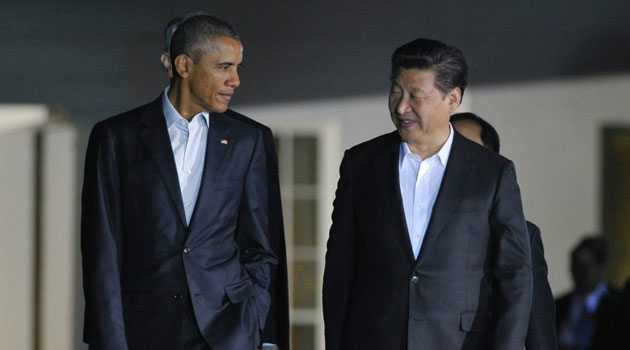
US President Barack Obama and China’s President Xi Jinping (R) walk from the White House to a working dinner at Blair House, on September 24, 2015 in Washington, DC/AFP
The pair kicked off Xi’s first state visit by shedding their ties and strolling out of the West Wing and across Pennsylvania Avenue to Blair House.
Officials hope that by starting with a casual meeting the leaders of the world’s two pre-eminent military and economic powers will find time for a less staid exchange of views.
On Friday Xi will be offered a 21-gun salute and ceremonial state dinner, in a symbolic statement that will let him show the Chinese people that he and his country are being treated as a great power.
But US officials admit the litany of problems now plaguing US-China relations and doubts over Xi’s commitment to a “peaceful rise” are unlikely to be resolved over butter-poached Maine lobster or grilled cannon of Colorado lamb.
“Far and away, the most constructive engagements they’ve had have been in their private dinners,” said senior Obama national security aide Ben Rhodes.
Thursday’s informal dinner is an opportunity, Rhodes said, to “put aside the talking points and actually get a window into one another’s world view.”
“And those world views are very different. And that’s part of why I think the conversations are useful and important, because it provides a context for all these issues.”
– ‘Cooperating and competing’ –
Xi — who kicked off his US visit in Seattle, meeting with top corporate CEOs — is seen in Washington as one of the strongest Chinese leaders in decades, consolidating political, military and government power at a speed not seen since Deng Xiaoping.
Even as the Chinese economy has slowed — calling into question Xi and the Communist Party’s technocratic bona fides — the president has tightened his grip on power at home.
But his assertiveness has prompted serious maritime, economic and cybersecurity disputes that US officials say risk throwing a complex and delicately balanced relationship out of kilter.
“At any one time we are cooperating and competing,” said one senior administration official, who asked not to be named.
“What we strive for is to make sure that competition doesn’t define the relationship and that competition is taking place in a way that is healthy and is fair.”
At previous summits, agreements on climate change, trade and military cooperation have helped emphasize the positives in US-China relations.
This time around, such breakthroughs are unlikely, although an agreement on cyber security has not been ruled out.
“I don’t think in this state visit you will see really attention-grabbing announcements,” said one US official.
– Cyber theft a ‘serious’ issue –
Obama and Xi will look to highlight cooperation to curb Iran and North Korea’s nuclear programs, efforts to tackle climate change and people-to-people ties.
An agreement is also expected to limit the risk of dangerous air-to-air military encounters.
On the eve of Xi’s visit, US officials revealed that two Chinese fighter jets had passed dangerously close to an American spy plane in international airspace over the Yellow Sea.
But such agreements treat the symptoms, according to Michael Green, a former National Security Council official now at the Center for Strategic and International Studies.
“The larger challenge, the harder question that the administration’s deferring on is, if the Chinese behavior continues and the most we can get are important but essentially Band-Aid cures for some of the symptoms, at what point does the US have to consider imposing costs,” he said.
A series of cyber hacks and Beijing’s forcible occupation of disputed territory in the South China Sea have prompted the Obama administration to send a message that these costs may come soon if Xi’s response is unsatisfactory.
“We have serious and fundamental concerns with Chinese state-sponsored cyber-enabled economic theft of our companies’ intellectual property and trade secrets, for the benefit of Chinese companies,” a senior administration official told AFP.
“The president has raised this a number of times with Xi, as have officials. We expect to see action. We will not hesitate to take the steps necessary to protect our economy and our companies,” the official said.
“This is not a minor irritant. It gets at the heart of our economy. It’s a national security and economic security issue. It’s of critical strategic importance.”














































